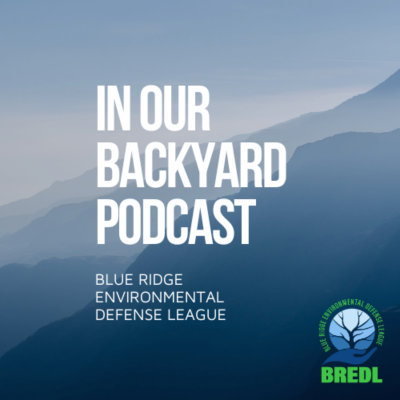
In Our Backyard Podcast
englanti
Talous & ura
Rajoitettu tarjous
2 kuukautta hintaan 1 €
Sitten 7,99 € / kuukausiPeru milloin tahansa.
- Podimon podcastit
- Lataa offline-käyttöön
Lisää In Our Backyard Podcast
This is Blue Ridge Environmental Defense League's (BREDL) Podcast where we discuss environmental issues that are right in our backyards. Topics include coal plants, fracking, pipelines, and much more. This podcast takes a deep dive into these topics and talks with people who are on the ground fighting for the health and safety of their communities as well as protection the planet.
Kaikki jaksot
185 jaksot26. From Conflict to Coexistence: Protecting North America’s Carnivores
Today we’re joined by Nadia Steinzor, Carnivore Conservation Director with Project Coyote, a national nonprofit working to promote coexistence between people and North America’s native carnivores. Nadia’s work sits at the intersection of science, policy, and community engagement, addressing a complex conservation challenge of how to live alongside predators in a rapidly changing landscape. When we talk about wild carnivores, we’re referring to species like coyotes, wolves, mountain lions, bobcats, foxes, and other native predators. These animals play a critical role as keystone species as they regulate prey populations, shape ecosystem structure, and even influence biodiversity and landscape health. Although, despite their ecological value, carnivores are often viewed as competitors or threats, particularly to livestock, game species, or human safety. Much of this is rooted in historical narratives, cultural fear, and political pressure rather than evidence. Contact and connect: https://projectcoyote.org/ [https://projectcoyote.org/]
25. The Cost of Wasted Food: Climate, Justice, and Systemic Change
In this episode, I speak with Yuka Nagashima, the Executive Director of Food Shift, she has spent her career working at the intersection of food, equity, and environmental impact. Food Shift is an organization dedicated to transforming our food system by addressing wasted food, redistributing surplus, and building more just, regenerative local food economies. Food touches every part of our lives. It shapes our health, our culture, our economy and our planet. Yet in the United States, we throw away up to 40 percent of the food we grow. At the same time, millions of people experience food insecurity every day. That contradiction tells us something important: this isn’t a problem of not having enough food. It’s a problem rooted in financial insecurity, immigration and labor conditions, land rights, transportation and logistics, and market expectations that demand constant abundance and “perfect” shelves. Contact and connect with Yuka: yuka@foodshift.net Food Shift: https://foodshift.net/ [https://foodshift.net/]
24. Under Threat: Sharks, Seas, and the Laws That Protect Them
Today, we’re joined by David McGuire, Executive Director of Shark Stewards, an organization dedicated to protecting endangered marine species and the critical ocean habitats they depend on. For more than fifty years, foundational laws such as the Endangered Species Act, the Marine Mammal Protection Act, and the National Marine Sanctuaries Act have served as our nation’s safety net for wildlife and wild places. First enacted under President Nixon, these landmark protections have saved countless species from extinction and safeguarded some of the planet’s most vital ecosystems. Today, that hard-won legacy is under serious threat. Efforts to weaken or dismantle these laws would create a crisis not only for wildlife, but for the health of our oceans and the coastal communities that rely on them. David is working to defend sharks, rays, and the broader ocean ecosystems they call home. From combating the global shark fin trade to establishing marine protected areas and engaging communities in hands-on science, Shark Stewards advances conservation from local beaches to international policy arenas. https://sharkstewards.org/saving-sharks/ [https://sharkstewards.org/saving-sharks/]
23. Fish On: Protecting Fisheries, Communities, and Coastlines
My guest is Anupa Asokan, executive director of Fish On, an organization working to ensure that coastal communities and the ecosystems they rely on can thrive for generations to come. Fish On is all about empowering the people who know the water best: the anglers, families, and coastal residents whose lives are tied to healthy oceans. Through community-driven advocacy, science-based policy, and a commitment to fairness and access, they’re helping shape the future of our fisheries from the ground up. In this conversation, Anupa breaks down what Fish On is and why its mission matters, especially at a time when coastal ecosystems face pressures from climate change, pollution, habitat loss, and outdated management practices. We’ll explore their three core priorities: common-sense fishery management, clean water, and equitable access. She also talks about how upstream watershed issues can ripple all the way to our coastlines, and the challenges that diverse and historically marginalized fishing communities face when trying to participate in conservation policy. We talk about the balance between short-term needs and long-term sustainability, what she wishes decision-makers understood right now, and a standout project where Fish On helped change policy by lifting up the voices of fishermen themselves. Contact and connect: https://www.fishon.us/ [https://www.fishon.us/]
22. Beyond the Reference Man: Generational Risks of Radiation Exposure
Today on the podcast, we’re joined by Mary Olson, Executive Director of the Generational Radiation Impact Project, or GRIP, an organization dedicated to understanding and addressing how radiation exposure affects people differently across age, sex, and generation. Mary has been a longtime advocate for more equitable and science-based radiation protection standards. Her work highlights something too often overlooked in nuclear policy: the fact that our current regulations are based on a so-called “reference man” ,an adult male model that doesn’t reflect the biological realities of women, children, or future generations. In our conversation, we explore why GRIP was founded and what its mission is, how scientific understanding of radiation’s impacts has evolved, and why the focus on “generational”matters now more than ever, 80 years after the first use of nuclear weapons. We also talk about what’s changed since we last spoke in 2020: new findings, new allies in science and policy, and what gives Mary hope that we can move toward a more inclusive, protective approach to radiation standards that safeguards everyone.
Valitse tilauksesi
Rajoitettu tarjous
Premium
Podimon podcastit
Lataa offline-käyttöön
Peru milloin tahansa
2 kuukautta hintaan 1 €
Sitten 7,99 € / kuukausi
Premium
20 tuntia äänikirjoja
Podimon podcastit
Lataa offline-käyttöön
Peru milloin tahansa
30 vrk ilmainen kokeilu
Sitten 9,99 € / kuukausi
Premium
100 tuntia äänikirjoja
Podimon podcastit
Lataa offline-käyttöön
Peru milloin tahansa
30 vrk ilmainen kokeilu
Sitten 19,99 € / kuukausi
2 kuukautta hintaan 1 €. Sitten 7,99 € / kuukausi. Peru milloin tahansa.

































